Key Research Topics
The ongoing development of automated vehicles requires new approaches for validation and approval. Conventional validation methods based on real-world driving are reaching their limits in view of the short development cycles and the wide range of variants of these vehicles. The associated high costs, safety risks and emissions during real driving as well as the rare occurrence of critical and therefore interesting scenarios are just some of the current challenges. The "Automated & Connected Mobility" (ACM) research group is investigating both the scenarios to be tested and the appropriate validation environment. The following key topics are being addressed in current research and industry projects:
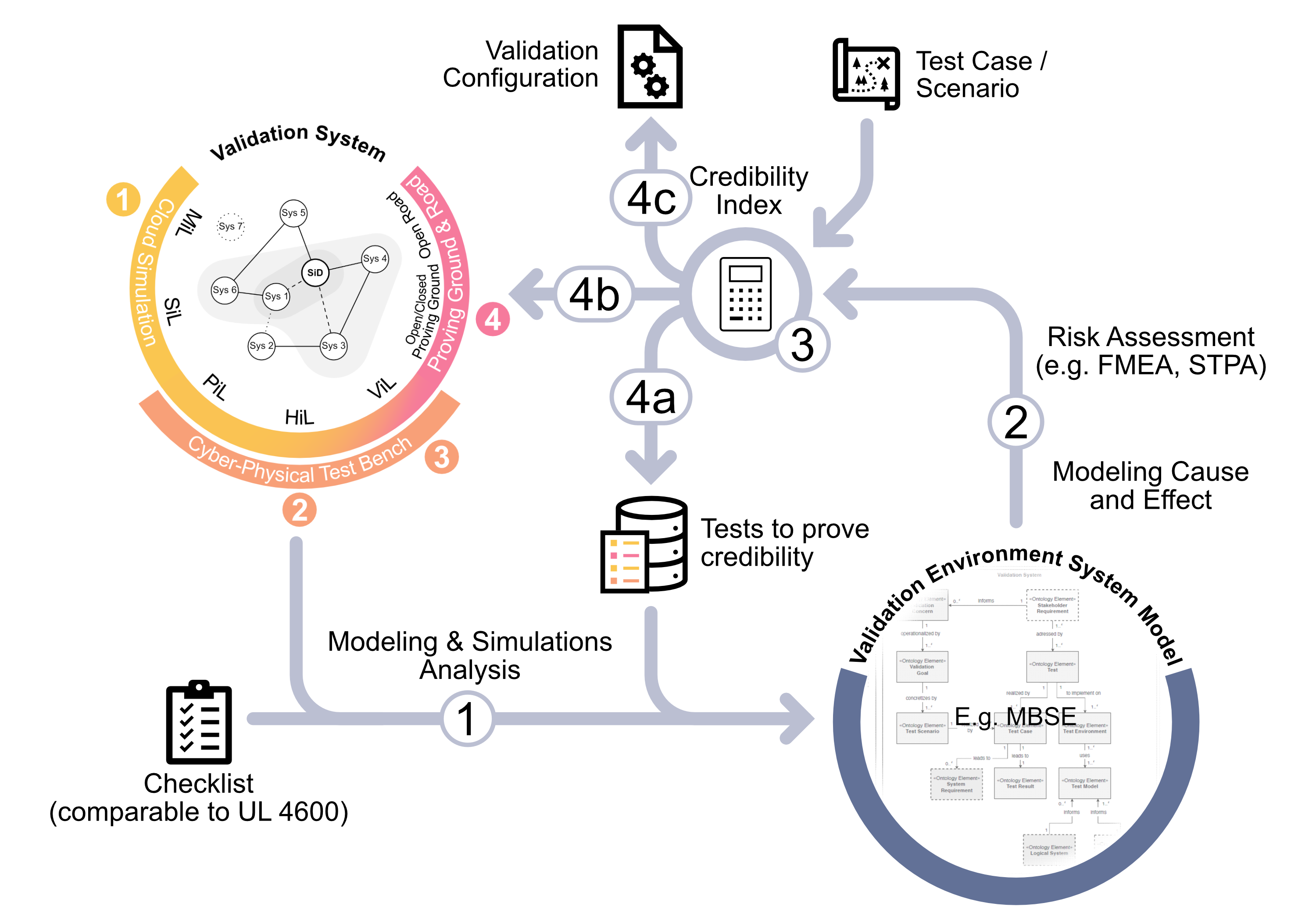 |
Credibility Assessment of virtual Validation EnvironmentsThe use of virtual validation and verification methods reduces effort and costs in the development of cyber-physical systems and products. However, the increased abstraction requires proof of credibility when using the results for homologation, approval or important development decisions. In several research and industrial projects, we are working on the development of a method for the credibility assessment of virtual validation methods. |
|
Validation Environment AllocationA large number of different validation environments are used in the development and validation of cyber-physical systems, such as automated vehicles. The specific choice of environment is often driven by habit or experience. In this research area, we deal with the question of how specific environments can be assigned to individual test cases or scenarios. The necessary and achievable credibility is an essential basis for decision-making. |
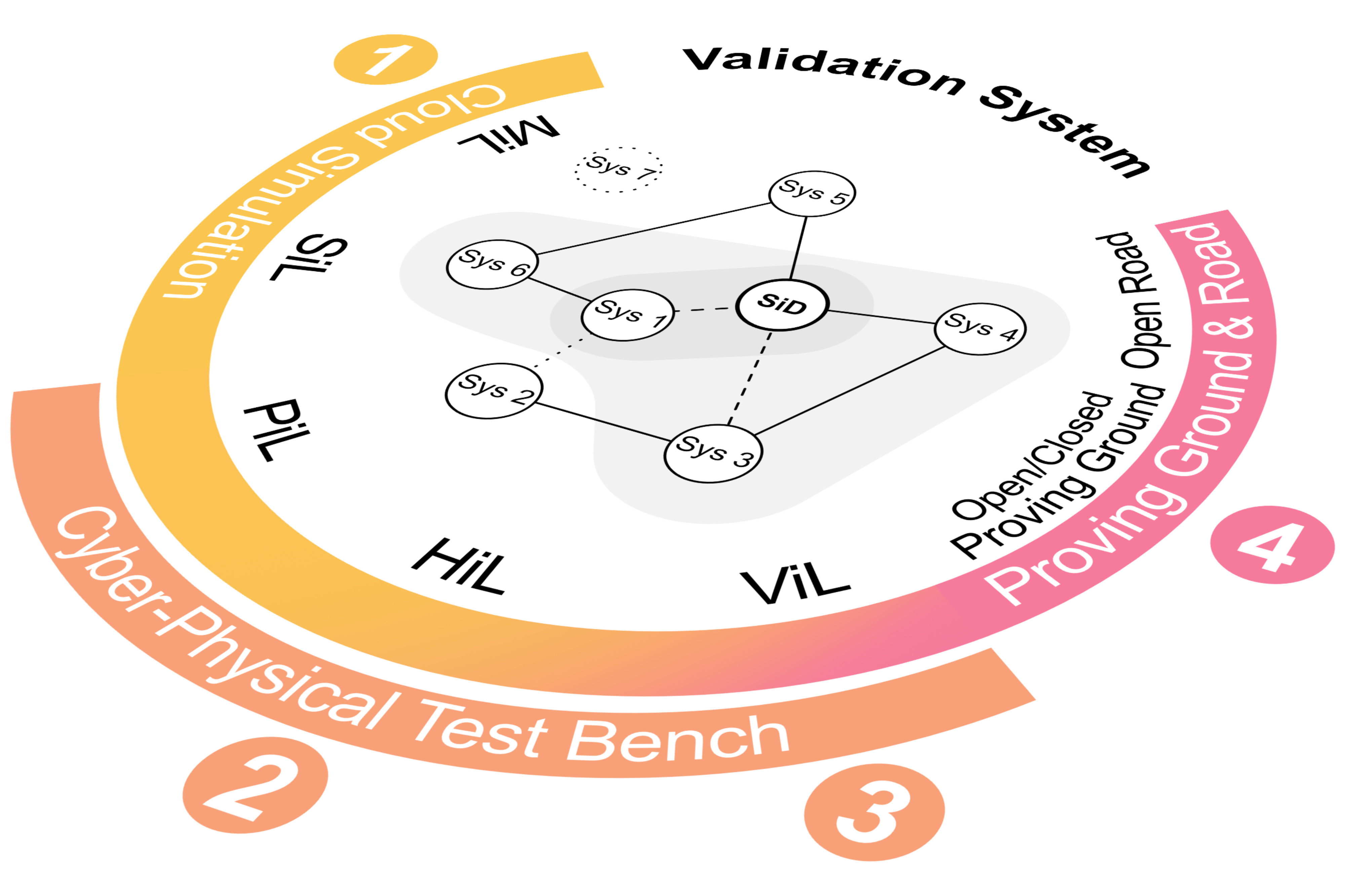 |
|
 |
Modular and Connected Validation EnvironmentsThe provision of an adequate validation environment depends largely on the available validation resources (test benches, infrastructure, methods, ...) of a project. Especially in the validation of automated driving functions, these resources and their efficient use represent the bottleneck in development. By researching the modularisation and connection of existing validation environments with a focus on the cyber-physical world, in particular vehicle-in-the-loop, hardware-in-the-loop and driver-in-the-loop, we are trying to reduce the restraining influence in development. |
|
Game-based Validation MetaverseWith our research project "Automated Vehicle Validation" - AVVA for short - we want to offer an approach for a new type of source for critical and relevant scenarios. Several people play simultaneously in a virtual environment and are confronted with challenges and mini-games, which they have to solve playfully and with the help of their own creativity. The game is continuously monitored and relevant scenarios are recorded. |
 |
|
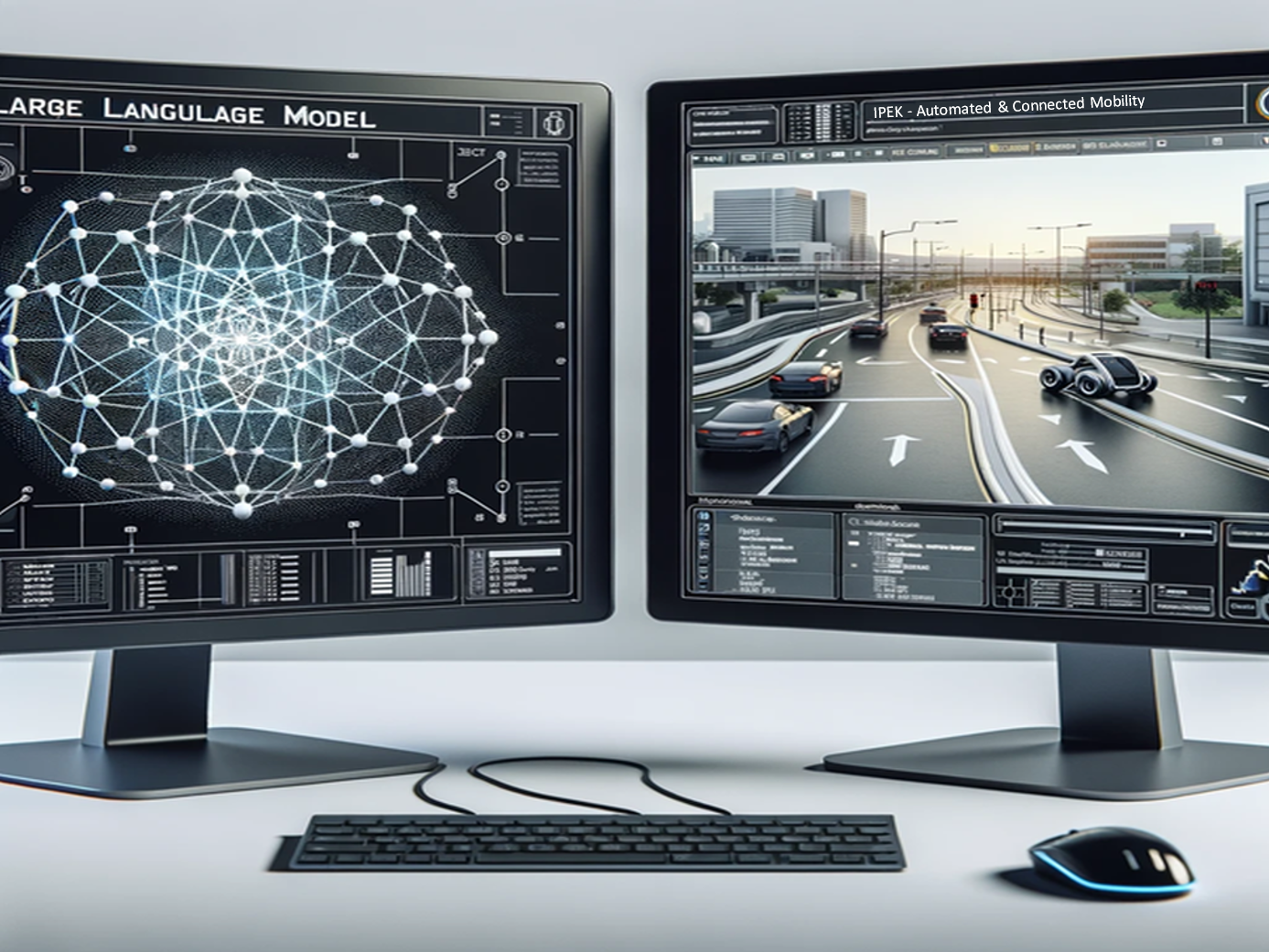 |
LLM Scenario GenerationCritical scenarios are a key element in the end-to-end protection of automated vehicles. Critical scenarios are currently derived from fleet data and accident statistics, among other things. In a new approach, we are using generative AI and, in particular, large language models (LLMs) to generate critical scenarios. |
|
Services
- Development of customised game-based environments to identify relevant scenarios or conflict situations
- Development of customised validation environments for testing ADAS/ADS such as steering and brake test benches (steering- and brake-HiL)
- Carrying out Vehicle-in-the-Loop (ViL) measurements with sensor stimulation
- Credibility assessment of validation environments
Testing Facilities
- Roller test bench: 2-axis driven roller test bench with closed-loop Vehicle-in-the-Loop capabilities
- Driving robot (Stähle SAP 2000)
- All common software solutions for vehicle and sensor simulation
- IPEK driving simulator with force feedback pedal
- Various test vehicles (conventional, hybrid, electric)
Chief Engineer


Department Manager Automated and Connected Mobility | Medical and Health Technology
Selected Publications
Fischer, D.; Weber, Y.; Freyer, J.; Bause, K.; Düser, T.
2024. 2024 IEEE International Automated Vehicle Validation Conference (IAVVC), 22nd-23rd October 2024, Pittsburgh, PA, 1–6, Institute of Electrical and Electronics Engineers (IEEE). doi:10.1109/IAVVC63304.2024.10786480
Jegarian, M.; Freyer, J.; Hamarneh, Q.; Klöck, L.; Schyr, A.; Schwammberger, M.; Düser, T.
2024. 2024 IEEE International Automated Vehicle Validation Conference (IAVVC), Pittsburgh, PA, USA, 22-23 October 2024, Institute of Electrical and Electronics Engineers (IEEE). doi:10.1109/IAVVC63304.2024.10786398
Urbano, F. P.; Grycz, P.; Freyer, J.; Bause, K.; Bischofberger, A.; Düser, T.; Albers, A.
2024. International Dependency and Structure Modeling Conference (DSM 2024)
Mueller, J.; Liu, X.; Maier, J.; Frey, G.
2024. 2024 IEEE 20th International Conference on Automation Science and Engineering (CASE), Bari, Italy, 28 August 2024 - 01 September 2024, 1889–1896, Institute of Electrical and Electronics Engineers (IEEE). doi:10.1109/CASE59546.2024.10711740
Düser, T.; Fischer, D.; Freyer, J.
2023. 2023 IEEE International Automated Vehicle Validation Conference (IAVVC), Austin, TX, 16th-18th October 2023, 1–6, Institute of Electrical and Electronics Engineers (IEEE). doi:10.1109/IAVVC57316.2023.10328076
Benedikt, M.; Böde, E.; Bossert, A.; Braband, J.; Brade, T.; Braun, N.; Braun, T.; Burton, S.; Dallmann, T.; Damm, W.; Düser, T.; Elster, L.; Fingscheidt, T.; Fistler, M.; Franek, M.; Fränzle, M.; Freyer, J.; Galbas, R.; Gansch, R.; Geyer, D.; Haas, L.; Haider, A.; Heidl, P.; Hein, M.; Heyl, A.; Hiller, J.; Hungar, H.; Hutter, D.; Jung, R.; Klein, C.; Krüger, J.; Kuhn, T.; Langner, J.; Maurer, M.; Mayr, K.; Meyer-Vitali, A.; Möhlmann, E.; Molin, A.; Möller, B.; Niehaus, J.; Nolte, B.; Nolte, M.; Otten, S.; Peleska, J.; Peters, S.; Poguntke, T.; Poprawa, F.; Reich, J.; Rosenberger, P.; Salem, N. F.; Schick, B.; Schneider, D.; Schneider, S.-A.; Schyr, C.; Thomas, C.; Trapp, M.; Wagner, F.; Wagener, N.; Woopen, T.; Zeh, T.
2023
Düser, T.; Fischer, M.; Schwarz, S. E.; Bastian, A.; Freyer, J.; Vlajic, K.; Eisenmann, M.; Matthiesen, S.; Albers, A.
2023. Metaverse – METAVERSE 2023 – 19th International Conference, Held as Part of the Services Conference Federation, SCF 2023, Honolulu, HI, USA, September 23–26, 2023, Proceedings. Ed.: S. He, J. Lai, L.-J. Zhang, 39 – 52, Springer Nature Switzerland. doi:10.1007/978-3-031-44754-9_4
Freyer, J.; Düser, T.
2023. 9th International Symposium on Transportation Data & Modelling (ISTDM2023), Ispra, June 19-22, 2023

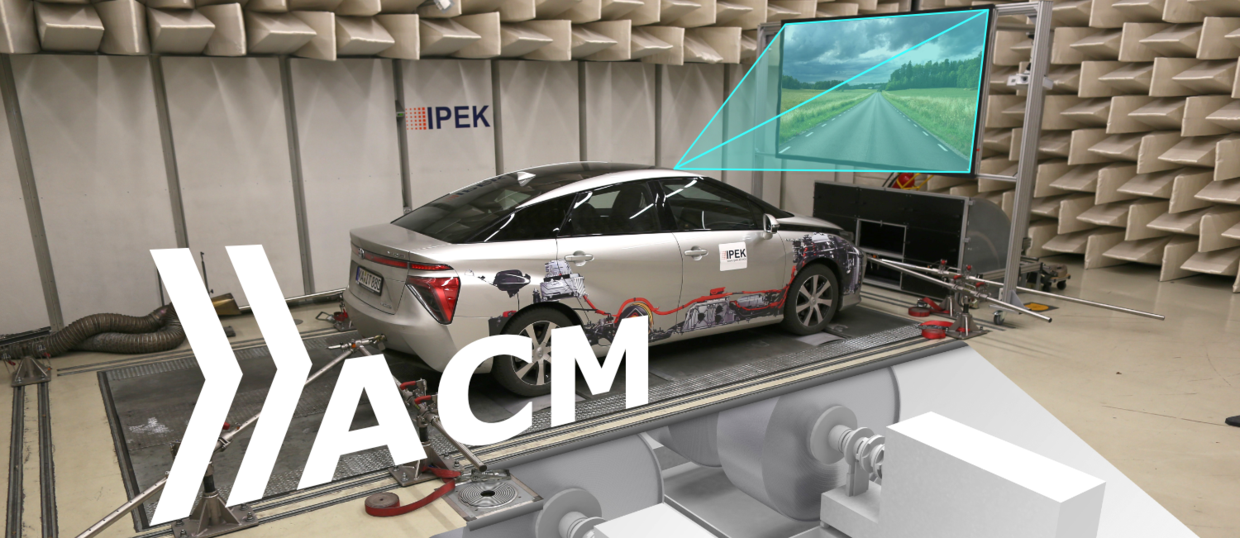

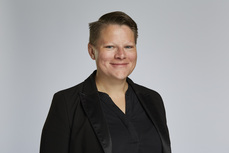
 108
108